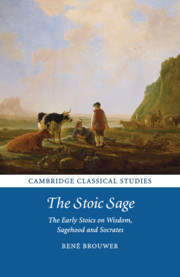Crossref Citations
This Book has been
cited by the following publications. This list is generated based on data provided by Crossref.
2014.
BOOKS RECEIVED.
The Classical Review,
Vol. 64,
Issue. 2,
p.
639.
Wysocki, Marcin
2015.
Ideał mędrca w listach św. Ambrożego.
Vox Patrum,
Vol. 64,
Issue. ,
p.
581.
Moran, Dermot
2016.
Identity and Difference.
p.
3.
Hunter, Richard
2016.
“Palaephatus,” Strabo, and the Boundaries of Myth.
Classical Philology,
Vol. 111,
Issue. 3,
p.
245.
Sierksma-Agteres, Suzan J. M.
2016.
Imitation in faith: enacting Paul’s ambiguouspistis Christouformulations on a Greco-Roman stage.
International Journal of Philosophy and Theology,
Vol. 77,
Issue. 3,
p.
119.
Brouwer, René
2017.
Aristotle’s Practical Philosophy.
p.
51.
2018.
Authors and Authorities in Ancient Philosophy.
p.
349.
Rudolph, Kelli
2018.
Authors and Authorities in Ancient Philosophy.
p.
139.
2018.
Authors and Authorities in Ancient Philosophy.
p.
331.
Bryan, Jenny
2018.
Authors and Authorities in Ancient Philosophy.
p.
20.
Long, A. A.
2018.
Authors and Authorities in Ancient Philosophy.
p.
242.
Lloyd, G. E. R.
2018.
Authors and Authorities in Ancient Philosophy.
p.
296.
Frede, Dorothea
2018.
Authors and Authorities in Ancient Philosophy.
p.
78.
Tsouni, Georgia
2018.
Authors and Authorities in Ancient Philosophy.
p.
263.
Uusimäki, Elisa
2018.
The Rise of the Sage in Greek and Jewish Antiquity.
Journal for the Study of Judaism,
Vol. 49,
Issue. 1,
p.
1.
2018.
Authors and Authorities in Ancient Philosophy.
p.
367.
Long, Alex
2018.
Authors and Authorities in Ancient Philosophy.
p.
58.
Hatzimichali, Myrto
2018.
Authors and Authorities in Ancient Philosophy.
p.
162.
Schofield, Malcolm
2018.
Authors and Authorities in Ancient Philosophy.
p.
278.
Duncombe, Matthew
2018.
Authors and Authorities in Ancient Philosophy.
p.
120.



